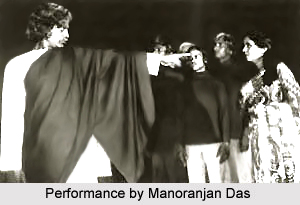 Manoranjan Das was born in the year 1921. He was popularly known as a trendsetting contemporary Oriya dramatist. His first work, Ratri i.e. "Night" in 1942, remains unpublished, while Janmamati i.e. "Birthplace" in 1943, Kavi samrat Upendra Bhanja i.e. "Emperor of Poets, Upendra Bhanja, in 1947, August Na i.e. "The Ninth of August" in 1947, and Bakshi Jagabandhu in 1949 were all for the professional stage. All these plays secured his place as a dramatist. He wrote these traditional plays initially, but soon chose a new path of his own and successfully forged a direct link with contemporary Western drama. He changed direction on Agami i.e. `Advent` in 1950, where he finally decided to compose unconventional drama, which severed his link with professional theatre.
Manoranjan Das was born in the year 1921. He was popularly known as a trendsetting contemporary Oriya dramatist. His first work, Ratri i.e. "Night" in 1942, remains unpublished, while Janmamati i.e. "Birthplace" in 1943, Kavi samrat Upendra Bhanja i.e. "Emperor of Poets, Upendra Bhanja, in 1947, August Na i.e. "The Ninth of August" in 1947, and Bakshi Jagabandhu in 1949 were all for the professional stage. All these plays secured his place as a dramatist. He wrote these traditional plays initially, but soon chose a new path of his own and successfully forged a direct link with contemporary Western drama. He changed direction on Agami i.e. `Advent` in 1950, where he finally decided to compose unconventional drama, which severed his link with professional theatre.
Career in Theatre for Manoranjan Das
Oriya group theatre started when United Artists, an amateur group constituted by Das, premiered Agami. It helped to establish psychological realism in Oriya theatre. Prominent groups have staged his plays to acclaim, like Srujani in Cuttack, Amritasya putrah i.e. "Immortal Son" in 1971, and Ebam Ame in Bhubaneswar Klanta prajapati i.e. `Tired Butterfly` in 1978. In Sagara manthan i.e. "Churning of the Ocean" that was performed 1964, Das adapted J. B. Priestley`s `An Inspector Calls`. His Banahamsi i.e. `Wild Goose` performed in 1968 was experimented with timelessness. The symbolic Aranya phasala i.e. `Wild Harvest` in 1971 contains absurdest traits. Bitarkita aparanha i.e. `Controversial Noon` in 1979 was based on the generation gap. The play was sentimental yet naturalistic. The musical Nandika Keshari in 1980, in which Das took the form of Desia Nata to develop the plot, analyses the failure of universal human values as well.
Manoranjan Das tried to uphold the spirit of changing times in his experimental drama. Although called by some the first absurdist Oriya playwright, he is in fact only an expert experimentalist in stagecraft, whereas the soul of his drama remains faithful to tradition. In his middle period he discarded music and dance, but brought them back in Nandika Keshari, perhaps to make it livelier. His dialogue is pithy, telegraphic, expressive yet philosophical. All these characters depart from the traditional descriptive emotional style. His experimental plays portray upper middle-class characters and the so-called elite of society. To some extent they were alienated from ordinary life. Thus Manoranjan Das failed to touch the hearts of the common masses and his `theatre of mood` faced severe criticism. Unperturbed, he continued his pursuit, built a separate identity, and ultimately influenced a number of talented dramatists. Many of his plays have been translated into other languages. He also made a major contribution to Oriya one-act drama, while working as producer of drama at All India Radio, Cuttack, he used the medium for the purpose of broadcasting.




